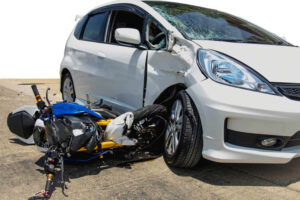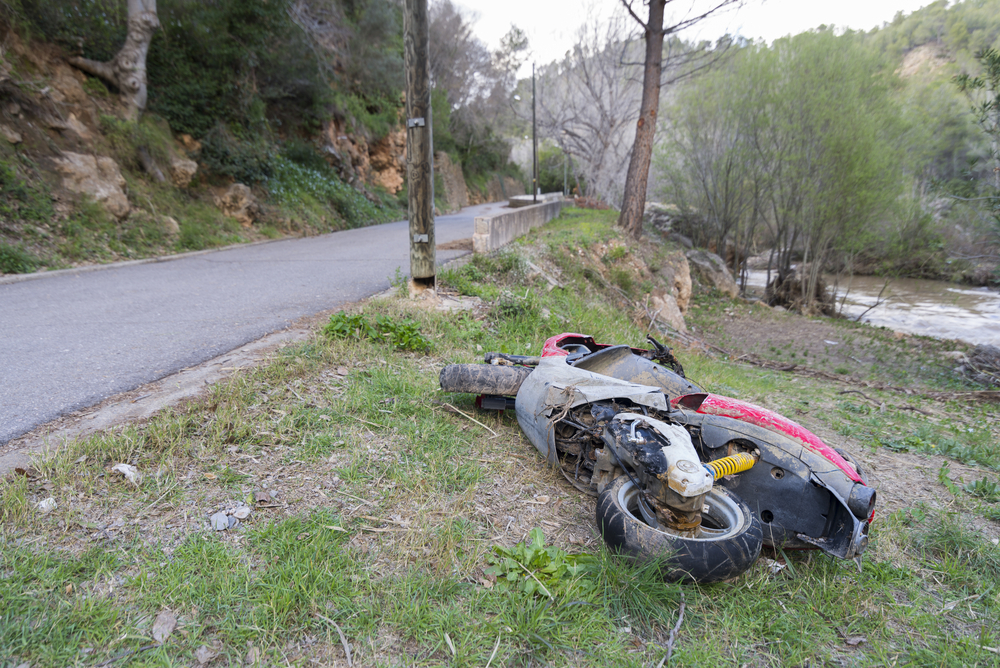Motorcycles are fun and exciting to ride, but they provide riders no protection in the event of an accident. Therefore, if you’re involved in a collision while riding your bike, you face the possibility of severe injuries and losses that can affect your overall health and quality of life. If someone else was to blame for the crash, you have the right to seek compensation for your losses by filing a motorcycle accident insurance claim or lawsuit in civil court.
Motorcycle accident victims often wonder: what is the average payout for motorcycle accidents? While this is a common question to ask, there is no one straight answer. Because all motorcycle accidents are unique, there is no average settlement amount. In reality, the overall value of your claim dictates how much you may be eligible to receive.
The best way to know how much you might receive for your accident-related losses is to seek a case evaluation with a motorcycle accident attorney.
Types of Damages Available for Motorcycle Accident Claims
When you experience a motorcycle collision, you may be eligible to pursue compensation for your injuries and losses. However, the type of compensation you can pursue depends on the details of your case.
Generally, the type of damages available in motorcycle accident claims includes the following.
Economic Damages
Economic damages are those concerning the tangible losses directly related to your motorcycle accident.
These damages can include:
- Past and future medical bills
- Therapy and rehabilitation costs
- Lost income
- Diminished earning capacity
- Property damage
Economic damages are easier to prove, as evidence is more readily available.
Non-Economic Damages
Non-economic damages relate to the intangible losses stemming from your motorcycle collision.
They can include:
- Pain and suffering
- Mental and emotional distress
- Permanent disability
- Scarring and disfigurement
- Loss of enjoyment of life
Because of the nature of non-economic damages, non-economic damages can be a bit more challenging to prove. For this reason, your lawyer must provide more information and documentation in an attempt to prove these damages.
Punitive Damages
Not every case involves punitive damages.
If the defendant who caused your accident committed reckless, malicious, or intentional acts, you may receive punitive damages.
Unlike damages that compensate victims, punitive damages punish the defendant and deter anyone else from acting the same way.
Is There an Average Payout for Motorcycle Accidents?
Every motorcycle collision case is unique, involving different details and circumstances, so you will find no relevant average payout for motorcycle accidents.
A knowledgeable motorcycle accident attorney can thoroughly investigate your case to understand better what a fair payout will look like for your particular claim.
Factors Affecting the Value of Your Motorcycle Accident Claim
Motorcycle accident claims are highly affected by several factors and details. By examining these specific factors, your motorcycle accident lawyer can better determine how much your case is worth.
A full understanding of your case’s value is critical to obtain maximum compensation.
The Extent and Severity of Your Injuries
Your injuries play a large role in figuring out how much your case is worth. The type of injuries, the severity of your injuries, and the extent of medical treatment needed all affect your compensation.
Injuries often depend on your motorcycle accident, but collision victims often face:
- Road rash
- Face and jaw fractures
- Broken bones
- Head and neck injuries
- Spinal cord injuries
- Internal injuries
- Soft tissue injuries
- Traumatic brain injuries
- Crush injuries
- Loss or limb injuries
Furthermore, many victims of motorcycle accident injuries also face life-altering consequences, including, but not limited to, paralysis, brain damage, and vision or hearing loss.
The more severe your injuries, and the more medical treatment you require, the more you’ll need to recover monetarily.
Whether Your Injuries Result in a Disability
In the most severe cases, motorcycle accident injuries result in disabilities. Whether it’s a permanent disability or a temporary disability, disabilities can hinder you from living life as you once did. More specifically, when you have a disability, you cannot work and provide for yourself and your family.
Your physician can determine whether you’ve suffered a disability and notate it on your medical records to use as evidence.
Whether Your Injuries Forced You to Take Time off Work
 It is not uncommon to need to take time off from work after a collision, especially a severe motorcycle accident.
It is not uncommon to need to take time off from work after a collision, especially a severe motorcycle accident.
If you have saved us sick or vacation days, your employer may pay you for those days. But if you need more extensive time off from work, you’re unlikely to receive your regular salary during that time.
For this reason, if you need time off work to recover from your injuries, you can pursue compensation for lost income.
Whether You Can Return to Work, and if so, to What Extent
When you suffer more substantial injuries, you may be unable to return to work for a long time, if at all. Your treating physician can better determine whether you’ll have limitations and whether these limitations will affect your ability to work like you did pre-accident.
If your motorcycle collision injuries strongly impact your ability to earn a living, you can pursue diminished earning capacity damages. If you’ve lost your ability to earn a living at all, you can seek lost earning capacity damages.
The Value of Your Property Damage
Along with your damages for physical and mental injuries, you can also seek to earn damages for property damage. Property damage compensation can cover the cost of your damaged or totaled bike.
The Intangible Losses Resulting From Your Collision
Intangible losses are those that are not as easily proven, like those having to do with mental health issues caused by your collision. These damages can be particularly challenging to assign a value, especially if you’re unsure what you can pursue compensation for or what calculation to use.
Your motorcycle accident lawyer can thoroughly review all of your losses and determine how best to calculate and prove your intangible losses to pursue the compensation you need.
Other Details to Consider Concerning Compensation for Your Motorcycle Accident
Along with the above details directly resulting from your accident, your motorcycle accident lawyer must also consider the following details. These factors strongly impact your ability to pursue compensation and settle or win your claim.
Liability—Who’s At Fault?
Liability plays a critical role in every type of personal injury case, including motorcycle accident claims. You cannot successfully pursue monetary recovery for the losses associated with your collision if you cannot establish and prove the other party’s liability.
While personal injury cases can arise out of intentional action, most result from negligence. Negligence is a person’s failure to act in the manner a similarly situated individual should have acted.
For example, if your motorcycle accident was caused by the other driver driving distractedly, this will be negligent. The reasonable driver will not drive while distracted, as distracted driving can easily cause accidents with anyone on the road.
To establish the responsible party’s liability, you must prove:
- Duty: The other party owed you a duty of care
- Breach: The other party’s actions caused them to breach their duty of care
- Causation: The other party’s actions were the direct and proximate cause of your motorcycle accident
- Damages: You suffered damages as a result of your collision
What and who caused your collision gives you direction. Without determining liability, you cannot seek damages for your losses.
Insurance Policy Limits
If another driver causes your motorcycle accident, and you seek to pursue compensation under their insurance coverage, you must determine the extent of their coverage.
Most states have laws providing minimum compensation every driver must carry. When state law requires drivers to have insurance, driving without insurance is illegal, and they must at least have minimum coverage.
While the minimum is what’s required, drivers can also elect to have more extensive coverage. Therefore, it’s crucial to figure out how much insurance coverage a driver has, as their insurance pays out up to their policy limits.
This can become an issue when your damages exceed a driver’s policy limits. For example, if your damages total $50,000 but they only have $25,000 in coverage, this can seriously affect your ability to recover the compensation you’re entitled to receive.
When this occurs, your motorcycle accident lawyer can create a legal strategy to figure out how to seek additional compensation, which may require filing a personal injury lawsuit on your behalf.
Insurance Claims vs. Lawsuits
When you suffer injuries in a motorcycle accident, you might have multiple options to pursue compensation. However, the road to take becomes clearer once you determine who is at fault for your accident.
If you’re involved in a motorcycle collision with the driver of a passenger vehicle, and they have insurance, you’d likely start by pursuing compensation through an insurance claim. If the insurance company denies or refuses to settle your claim, you may need to file a lawsuit.
When an uninsured driver causes your collision, the viable choice might be a personal injury lawsuit directly against that driver. Because they do not have insurance coverage, they are directly financially liable for your accident.
Seeking monetary recovery via an insurance claim or lawsuit can impact how much you can receive. This is especially true regarding lawsuits, as your case may settle outside court, or you may have to go to trial. You may end up with different outcomes based on how your lawsuit proceeds.
Additionally, the route you take can impact the timeline for your payout. When your case is difficult to settle or ends up in trial, you can expect to wait a bit longer for your case to be resolved and receive payment.
Filing insurance claims and lawsuits can be overwhelming and stressful, especially if you have little to no experience. Fortunately, your motorcycle accident lawyer can help you navigate your claim and determine what course of action will produce the most favorable results for you.
Proving Your Losses
It is not simply enough to claim you’ve sustained all your injuries and losses; you must also prove them through strong evidence and documentation.
The best evidence for your case depends can include:
- Photos and videos
- Eyewitness statements
- Surveillance footage
- Traffic cam footage
- Police reports
- Medical records
- Doctor’s notes
- Expert testimony
If you can begin collecting evidence at the scene of your accident, that can substantially help your claim. Take photos and videos and speak to witnesses to get their contact information.
Some evidence may not be available right away, like police reports and medical records. As they become available, your motorcycle accident lawyer can request and obtain these critical pieces of evidence to help strengthen your claim and definitively prove your losses.
A Motorcycle Accident Attorney Can Pursue Fair Monetary Recovery for You

Never handle your motorcycle accident case on your own. Motorcycle accident lawyers work on contingency, so if you do not win your case, you don’t owe your lawyer any payment out of pocket.
You can afford legal help when you need it most. A personal injury law firm in New Port Richey has the right skills and tools to get you the most beneficial payout and help you move on with your life after your collision.



